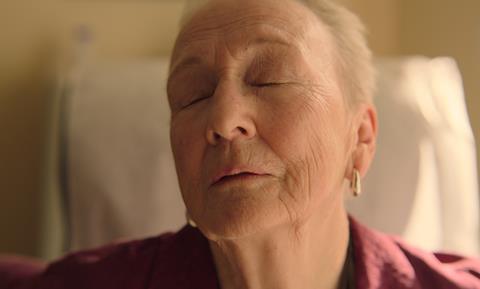Sensitive drama follows an American woman struggles to keep hold of herself in the face of dementia

Dir/scr: Sarah Friedland. US. 2024. 91mins
Ruth Goldman (Kathleen Chalfant) has been a wife and mother, a professional cook and the author of several recipe books. Now, with dementia shorting the circuits of her memory, she must grow into a new life in an assisted living facility. At some moments she snaps into focus, bringing brisk authority to her encounters with the staff and fellow residents; at others, she’s adrift, as if the moorings of her identity have come untied. There’s a profound tenderness in Sarah Friedland’s affecting first feature and a rare empathy: crucially, we observe Ruth’s experiences predominantly through her own eyes rather than those around her. It’s a decision that affords her a degree of respect, which is all too frequently missing when it comes to depictions of the elderly.
Shows the ravages of the disease but maintains the dignity of the sufferer
This is a small but powerful picture which draws on Friedland’s previous experiences both as an elder care-worker, and as a choreographer and dance filmmaker (a key focus throughout the film is the way Ruth moves, navigating both the unfamiliar terrain of her failing memory and the physical space, with its impersonal corridors and sympathetic strangers). Films about dementia don’t tend to figure on audience’s good time viewing lists, but Familiar Touch is rather special – it shows the ravages of the disease but maintains the dignity of the sufferer. A raft of prizes from Venice’s Horizons jury including Best Director and Actress as well as its Lion of the Future award will help ease it into wider play.
The film’s unusual methodology should provide an additional talking point for audiences at further festivals and beyond following its Venice Horizons debut: the long-gestating project was made as a collaboration with the residents and staff of a real life retirement home, Villa Gardens in California, which is described as a collectivist retirement home for female educators. Residents of the home appear in the film as cast members, and were also involved in every behind-the-camera department.
It’s no surprise, then, that the picture approaches its themes with a clear-eyed authenticity. It’s also worth mentioning that Ruth’s experience is one of considerable privilege. The care facility that she first mistakes as a hotel provides the kind of personalised support that comes at a price. Our first encounter with Ruth, in the elegant home that she has forgotten that she is due to leave, speaks volumes about the comfortable life she has led up until now. Her house is rich with books and art; her wardrobe is full of quality pieces – even when the memories are slipping out of focus, she takes great care in choosing her clothes and appraising her outfits in the mirror.
The kitchen is her domain. Her movements, as she floats around her work surfaces preparing her signature open sandwich, are fluid and serene. There’s one little glitch – she takes a slice of freshly toasted bread and puts it into the plate rack, but then she returns to the job at hand. She is charm personified when her lunch guest, a younger man, arrives. She treats him as a suitor, flirting archly. His stricken expression tells us, before he says anything, that he is her son.
It’s a remarkable performance from Chalfant, who creates a mosaic portrait of a woman, a personality in shattered fragments that we reassemble to reveal vestiges of a strong, warm and charismatic whole. Particularly affecting is Ruth’s relationship with her assigned nurse, Vanessa (Carolyn Michelle) – or “my friend”, as Ruth insists. In one tragicomic scene, Ruth sweeps into the kitchen of her care home and takes control, manning the fruit salad station with efficiency and flair. When Vanessa arrives to coax her out of the kitchen, Ruth spots the nurse’s armful of textbooks and orders her to sit and study while she prepares a nourishing breakfast.
Her passion for food endures even when she can’t remember that she’s a mother. When other residents make Valentine cards in a craft project, Ruth writes a list of ingredients in her firm, clear handwriting. As the film unfolds, it becomes clear that we only see Ruth in her moments of lucidity – the moments when she sees herself. And the gaps between those moments are getting longer. It’s achingly sad, like watching a woman standing on a gradually eroding island of sand as the tide comes in and realising that, sooner or later, she will be completely submerged.
Production company: Rathaus Films, Go For Thurm
International sales: Memento International sales@memento-films.com
Producers: Alexandra Byer, Matthew Thurm, Sarah Friedland
Cinematography: Gabe. C Elder
Editing: Aacharee “Ohm” Ungsriwong, Kate Abernathy
Production design: Stephanie Osin Cohen
Main cast: Kathleen Chalfant, Carolyn Michelle, Andy McQueen, H. Jon Benjamin















![[L-R]: Amanda Villavieja, Laia Casanovas, Yasmina Praderas](https://d1nslcd7m2225b.cloudfront.net/Pictures/274x183/6/4/1/1471641_pxl_20251224_103354743_618426_crop.jpg)








